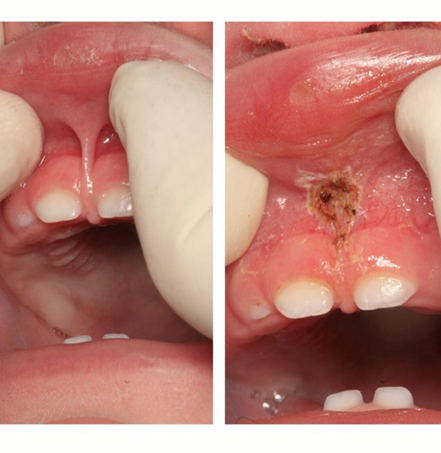A frenectomy, also known as a frenotomy, can refer to any procedure where binding tissue on the body is cut or modified.
In your mouth, the “frenum” refers to a piece of soft tissue connected to the lips and gums. If the frenum is too short or too tight, it can interfere with breastfeeding, swallowing, or speech development.
Lingual frenectomy
The lingual frenum connects your tongue to your mouth. If you touch your tongue to the roof of your mouth, you can probably feel the lingual frenum stretching underneath your tongue.
The length of the lingual frenum varies from person to person. In some cases, people are born with a lingual frenum that’s very short. This shortened frenum restricts the movement of the tongue.
This condition is called ankyloglossia, or “tongue tie.” Tongue tie occurs in nearly 5 percentTrusted Source of infants. It’s more common in boys than in girls.

Maxillary frenectomy
The labial frenum connects your top lip to the gum area right above your front teeth.
If this frenum is shorter than average, it can cause difficulty in speech development. This condition is a type of lip adhesion.
A lip adhesion can also pose a problem with dental development and make it hard to fully clean the gums and front teeth. This raises the risk of gum disease and other dental complications. A maxillary frenectomy can give the upper lip more mobility.
How painful is a frenectomy?
Not to worry, a labial frenectomy is a quick and pain-free procedure that is done in one visit. At Fortino Dental we do laser surgery not the traditional surgery. Laser surgery quick and painless and takes less time for healing.
Can a frenectomy go wrong?
The surgery to correct tongue-tie is called a frenectomy. It involves cutting the lingual frenum. The procedure is usually quick and simple. Complications are rare, but there are always some risks to surgery, including bleeding, infection, or scarring.
Copyright © 2022 Fortino Dental.